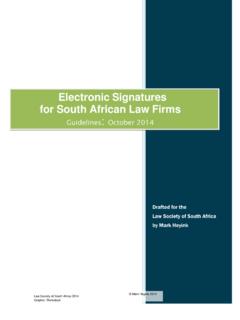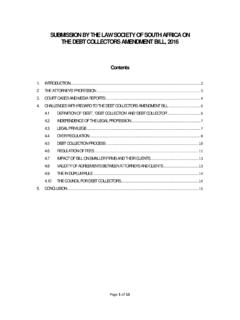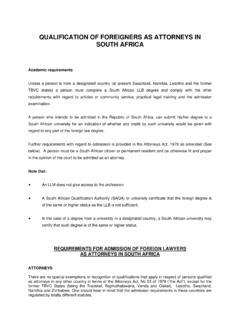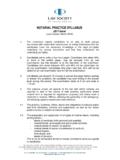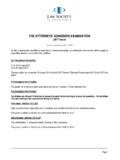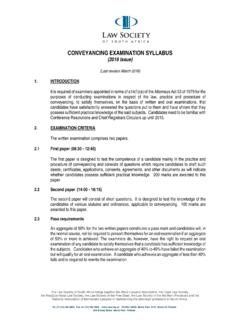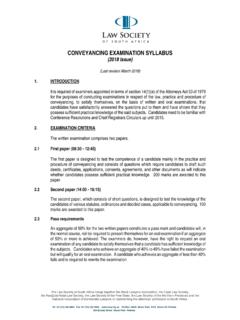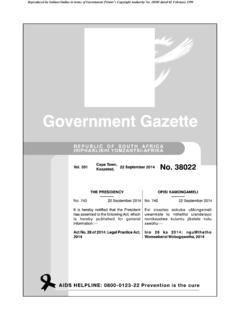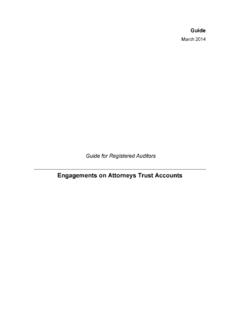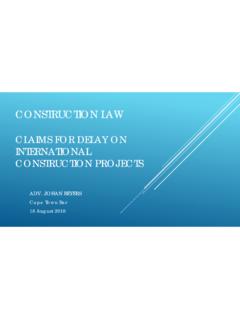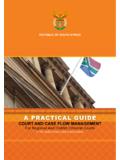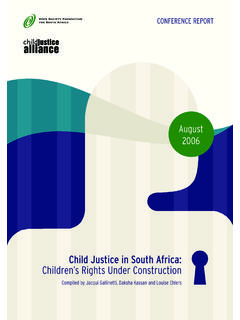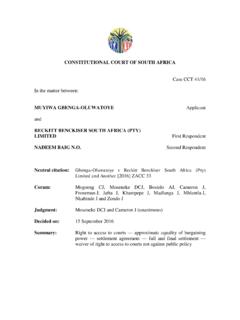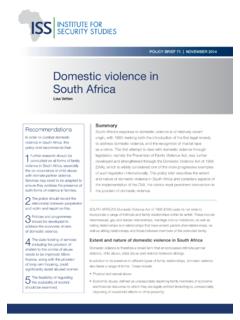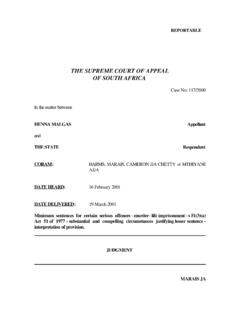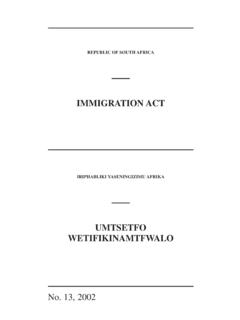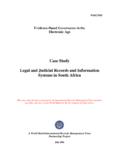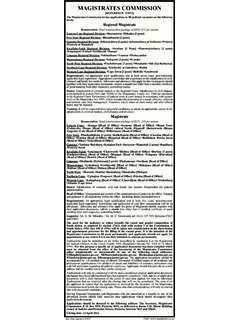Transcription of Civil Practice Directives 2013 revision - Law Society …
1 Civil Practice Directives . Civil Practice Directives . FOR THE. regional COURTS. IN south africa . 2013 revision Page | 0. Civil Practice Directives . INTRODUCTION. The Civil Practice Directives embraces the constitutional principle that everyone has the right to have any dispute that can be resolved by the application of law decided in a fair public hearing before a court or, where appropriate, another independent and impartial tribunal or forum as well as the principle that justice must also be seen to be done. The Practice Directives deal essentially with the daily functioning of the courts, court - and case-flow management and intend to introduce uniformity. In addition, also to inform and involve stakeholders and all those who participate or take an interest in the court system at regional court level. Subject to any Directives issued by the Chief Justice, these Practice Directives are binding as regional court President's Directives and acquire the legal force and effect which such Directives have.
2 It does not seek to override the Rules of court which have the force of law and may be amended from time to time by the regional court Presidents' Forum as and when circumstances so dictate. Any reference in the Directives to Rules refer to the Rules Regulating the Conduct of the Proceedings of the Magistrates' Courts of south africa published under GN R740 in GG 33487 of 23 August 2010, as amended. These Practice Directives are procedures dictated by general experience and are not intended to impede the freedom of the presiding officer to determine the procedure in a particular case at a conference convened in terms of section 54(1) of the Magistrate's court Act as to facilitate the expeditious handling of disputes in a cost effective manner. No interpretation of these Practice Directives should have the effect that access to justice is denied to any litigant, in particular the indigent.
3 Page | 1. Civil Practice Directives . INDEX. 1 SUBSTITUTED SERVICE 3. 2 PROOF OF SERVICE BY REGISTERED POST 4. 3 MOTION court 4. 4 Civil TRIALS 7. 5 MORA INTEREST 12. 6 DIVORCE MATTERS 12. 7 APPLICATIONS FOR DEFAULT JUDGMENT. IN ACTIONS FOR DAMAGES 14. 8 RESERVED JUDGEMENTS 14. 9 DOCUMENTS AND PLEADINGS 15. 10 SECURITY OF CASE FILES 15. 11 GENERAL PROVISIONS 15. 12 DELEGATION 16. 13 CONSULTATIONS 16. 14 COMMENCEMENT 17. Page | 2. Civil Practice Directives . 1 SUBSTITUTED SERVICE. A summons or order of court to be served by way of publication in a newspaper or other publication must be published in the language of the newspaper or publication unless otherwise ordered. As proof of such publication the whole page showing the name and the date of the newspaper should be filed. If only a cutting of the summons or order is produced, the date and newspaper in which it was published should be proved by way of an affidavit.
4 An explanation as to why the whole page was not submitted should also be given. If substituted service is to be effected by service at the electronic mail address of a party , the following is applicable: When the party is in a foreign country, the application must be accompanied by an application for edictal citation. The application in terms of Rule 10 must be accompanied by an affidavit confirming the identity of the respondent, postal/physical address and the electronic mail address at which the respondent will receive service of the summons. A copy of any electronic mail correspondence including attachments between the parties may be attached as proof of the validity of the electronic mail address. The sheriff is ordered to serve the summons, annexures and pleadings by way of electronic mail on the address as is ordered by the court , indicating what processes have been served by way of electronic mail and the number of pages that were mailed.
5 Where service could be effected as provided for in terms of Rule 9(14) and/or Rule 9(15), an application in terms of Rule 10(1)(b) must be accompanied by an affidavit in which proper and fully motivated reasons must be furnished as to why service as provided for in Rule 9(14) and/or Rule 9(15) cannot be effected. Page | 3. Civil Practice Directives . 2 PROOF OF SERVICE BY REGISTERED POST. Service of any document by registered post by the Sheriff, must be in compliance with Rule 9(13). When service or delivery of any document by registered post is prescribed or authorized in any action or application, such service shall be proven by the production of documentary proof of such posting as well as an affidavit by the party who procured the dispatch of such document, in which he/she- confirms the date of dispatch together with the name and address of the addressee.
6 Describes the document so dispatched; and confirms, that the registered item in question had been delivered by attaching proof of delivery 3 MOTION court . Unopposed motion matters are heard on a day (or days) at such a seat (or seats) as determined by the regional court President in each regional Division. The roll closes at 12h00 at least five (5) court days prior the date determined for the hearing of the application. Longer periods may be determined by the regional court President for circuit sessions. Once the roll is closed the parties are not entitled to access the court file and may only insert or remove documents from it under exceptional circumstances and when authorized by the presiding officer. Should there be no appearance by or on behalf of any of the parties when a matter is enrolled and called, the court may strike the matter off the roll.
7 The matter will be enrolled upon a request setting out full reasons why the party failed to attend court . Page | 4. Civil Practice Directives . Draft orders in triplicate are to be submitted in all matters not later than closing of the roll. Prior to the hearing of the application, the applicant must deliver a complete index of all documentation before the court for the determination of the application. The index should describe each affidavit and annexure as a separate item. This Practice is applicable to opposed and unopposed motion proceedings. Binding of Documents: Documents shall be bound in such a way that allows easy and unhindered turning of pages and each bundle shall not consist of more than 100 pages each. All handwritten documents are to be copied and typed versions prepared and inserted immediately thereafter in the record as far as practically possible.
8 Exceptions may be considered for indigent litigants. All the documents should be properly paginated. Applicant must ensure that all the documents including the Notice of motion, founding affidavit and annexures and any replying affidavit are properly paginated before service on the respondent. The respondent must also ensure that the answering affidavit and annexures are properly paginated prior to serving on the applicant. Continuous rolls should be the norm, except in centres where this is not possible. Roll call of all motion matters will take place in court and thereafter the schedule for hearing of matters will be set. Practice notes Page | 5. Civil Practice Directives . The legal representative for each party in a motion which appears on the opposed roll, is to file a Practice note with the registrar, on closing of the roll.
9 The Practice note shall set out - the name of the parties, the case number and its number on the roll;. the names and telephone numbers of all legal representatives in the motion;. the nature of the motion;. an indication of the issues to be determined in the application;. the relief sought at the hearing by the party on whose behalf the legal representative is completing the Practice note;. an estimate of the probable duration of the motion;. if the matter is urgent, and if so, motivate the urgency; and whether or not the papers need to be read and, if so, which portions thereof. In the absence of a Practice note from the applicant, a motion appearing on the opposed roll will be removed from the roll, unless the presiding officer directs differently. A Practice note must be filed as set out in 1 above on each occasion the motion appears on the opposed roll.
10 Concise heads of argument are to be attached to the Practice note at the time of filing thereof. In the event that the day on which the Practice note and concise heads are to be filed falls on a public holiday, such documents shall be filed on the preceding court day. Page | 6. Civil Practice Directives . 4 Civil TRIALS. Allocation Of Civil Trials Only matters that are ready for a hearing and indexed and paginated on the date of the request for allocation, will be allocated a trial date. To ensure compliance with Rule 22(4), an allocation register must be kept and all allocations must be done in an open and transparent manner. The regional court President or his/her designated representative will allocate the matter to a presiding officer for hearing. The trial date should be determined by the presiding officer to whom the matter has been allocated to only after the pre-trial procedure is concluded satisfactorily.
